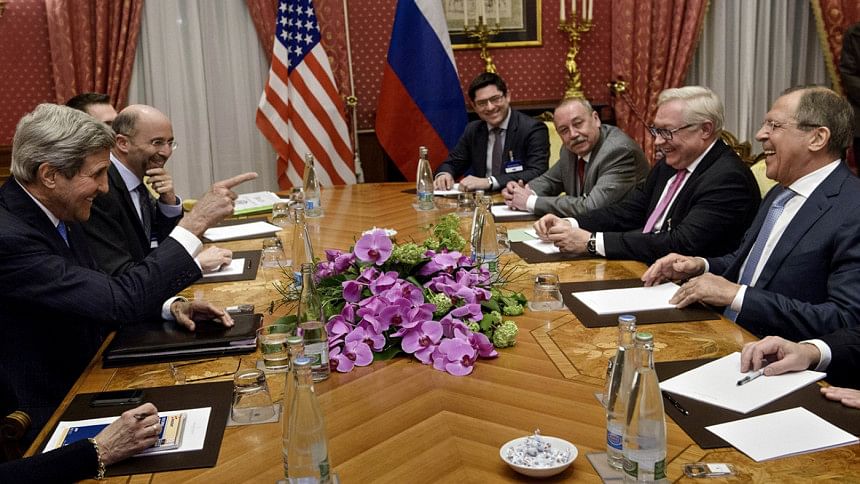Iran nuclear talks near key deadline

Talks have resumed in Switzerland ahead of Tuesday's deadline for a preliminary nuclear deal with Iran.
Foreign ministers from six world powers are meeting their Iranian counterpart, amid hopes of a breakthrough after almost 18 months of negotiations.
They want to impose limits that would prevent Iran from producing enough fuel for a nuclear weapon within a year.
Iran, which insists its nuclear programme is peaceful, wants to see crippling sanctions lifted in return.
End of the E3/EU+3 Foreign Ministers meeting #IranTalks #IranTalksLausanne #NuclearTalks pic.twitter.com/3EslZ0mBPI
— Nuclear Talks (@NuclearTalks) March 30, 2015
Iranian and Western officials have said that a deal is possible, but that some issues are still to be resolved.
'NO COMPROMISE'
The negotiations in Lausanne were expected to intensify on Monday, with foreign ministers from the so-called P5+1 - comprising the US, UK, France, China, Russia and Germany - meeting Iran's Mohammad Javad Zarif. The EU foreign policy chief Federica Mogherini is also there.
They are aiming to agree on a political framework by Tuesday night that would set the stage for talks on the technical details of a comprehensive accord, due by 30 June.
"We are here because we believe a deal can be done," UK Foreign Secretary Philip Hammond told reporters as he arrived in Lausanne on Sunday night.
"But it has to be a deal which puts the bomb beyond Iran's reach," he added. "There can't be any compromise about that."
At the scene: Lyse Doucet, BBC News, Lausanne
It's going down to the proverbial wire in this crucial round of nuclear talks. One Western diplomat spoke of "some quite important gaps".
Two main disputes continue to be which sanctions will be lifted and when, and what kind of nuclear research and development Iran can still pursue.
As Iran's team sits with all six foreign ministers, observers say it's still not clear if they're engaging in high stakes bargaining or have no more political space to move forward.
For Iran, elements like ending sanctions tied to UN Security Council resolutions matter in financial and political terms. For world powers, "putting the bomb beyond Iran's reach" is the main imperative.
All sides indicate talks could slip past Tuesday's self-imposed deadline, into the early hours of Wednesday. All sides use the word "tough" to describe this historic endgame. Even if they agree a framework, there's still a huge amount of work ahead to draft a final deal by the end of June.
Zarif, who has been holding talks with US Secretary of State John Kerry since Thursday, said he believed they could "make the necessary progress to be able to resolve all the issues and start writing them down".
The BBC's Barbara Plett Usher in Lausanne says the essence of the emerging deal is to keep Iran at least one year away from being able to produce enough nuclear fuel for a single weapon.
Those restrictions would last at least a decade, and include rigorous inspections of its nuclear facilities, in exchange for an end to crippling sanctions, our correspondent adds.
On Monday, a Western diplomat told reporters there were three major outstanding issues:
Length of restrictions - Iran's nuclear activities would be strictly limited for at least 10 years. After that, Iran wants all limits to be lifted. The P5+1 says they should be removed progressively over the following five years
Sanctions relief - Iran wants the UN sanctions suspended soon after an agreement. The P5+1 says they should be eased in a phased manner, with restrictions on imports of nuclear-related technology remaining for years
Non-compliance - The US and its European allies want a mechanism that would allow suspended UN sanctions to be put back into effect rapidly if Iran reneges on a deal. Russia reportedly accepts this, but wants to ensure its Security Council veto rights are protected
"There cannot be an agreement if we do not have answers to these questions," the diplomat was quoted as saying by the Reuters news agency.
"The feeling is that if things are to happen, it's now that the pieces will fit together. There's a moment when you have to say 'yes' or 'no'."
Adding to the sense of brinkmanship, on Sunday night Iran's lead negotiator said it was no longer willing to ship its existing stockpile of nuclear fuel outside the country, something until now seen as an important part of a deal, our correspondent says.
Another point of contention is Iran's desire to be able to develop advanced centrifuges, which could enrich uranium faster and in greater quantities. While enriched uranium is used as fuel for nuclear reactors, it can also be used to make nuclear bombs.
On Sunday, Israel's Prime Minister Benjamin Netanyahu reiterated his opposition to the proposed deal, saying it "bears out all of our fears, and even more than that".

 For all latest news, follow The Daily Star's Google News channel.
For all latest news, follow The Daily Star's Google News channel. 



Comments